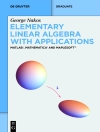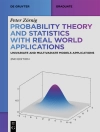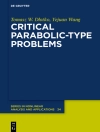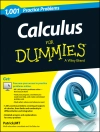Covers multivariable calculus, starting from the basics and leading up to the three theorems of Green, Gauss, and Stokes, but always with an eye on practical applications.
Written for a wide spectrum of undergraduate students by an experienced author, this book provides a very practical approach to advanced calculus—starting from the basics and leading up to the theorems of Green, Gauss, and Stokes. It explains, clearly and concisely, partial differentiation, multiple integration, vectors and vector calculus, and provides end-of-chapter exercises along with their solutions to aid the readers’ understanding.
Written in an approachable style and filled with numerous illustrative examples throughout, Two and Three Dimensional Calculus: with Applications in Science and Engineering assumes no prior knowledge of partial differentiation or vectors and explains difficult concepts with easy to follow examples. Rather than concentrating on mathematical structures, the book describes the development of techniques through their use in science and engineering so that students acquire skills that enable them to be used in a wide variety of practical situations. It also has enough rigor to enable those who wish to investigate the more mathematical generalizations found in most mathematics degrees to do so.
- Assumes no prior knowledge of partial differentiation, multiple integration or vectors
- Includes easy-to-follow examples throughout to help explain difficult concepts
- Features end-of-chapter exercises with solutions to exercises in the book.
Two and Three Dimensional Calculus: with Applications in Science and Engineering is an ideal textbook for undergraduate students of engineering and applied sciences as well as those needing to use these methods for real problems in industry and commerce.
قائمة المحتويات
Preface xi
1 Revision of One-Dimensional Calculus 1
1.1 Limits and Convergence 1
1.2 Differentiation 3
1.2.1 Rules for Differentiation 5
1.2.2 Mean Value Theorem 7
1.2.3 Taylor’s Series 8
1.2.4 Maxima and Minima 12
1.2.5 Numerical Differentiation 13
1.3 Integration 16
Exercises 22
2 Partial Differentiation 25
2.1 Introduction 25
2.2 Differentials 29
2.2.1 Small Errors 30
2.3 Total Derivative 33
2.4 Chain Rule 36
2.4.1 Leibniz Rule 39
2.4.2 Chain Rule in n Dimensions 41
2.4.3 Implicit Functions 42
2.5 Jacobian 43
2.6 Higher Derivatives 46
2.6.1 Higher Differentials 49
2.7 Taylor’s Theorem 50
2.8 Conjugate Functions 52
2.9 Case Study: Thermodynamics 54
Exercises 58
3 Maxima and Minima 61
3.1 Introduction 61
3.2 Maxima, Minima and Saddle Points 63
3.3 Lagrange Multipliers 74
3.3.1 Generalisations 77
3.4 Optimisation 81
3.4.1 Hill Climbing Techniques 81
Exercises 85
4 Vector Algebra 89
4.1 Introduction 89
4.2 Vector Addition 90
4.3 Components 92
4.4 Scalar Product 94
4.5 Vector Product 97
4.5.1 Scalar Triple Product 102
4.5.2 Vector Triple Product 105
Exercises 106
5 Vector Differentiation 109
5.1 Introduction 109
5.2 Differential Geometry 111
5.2.1 Space Curves 112
5.2.2 Surfaces 120
5.3 Mechanics 129
Exercises 135
6 Gradient, Divergence, and Curl 139
6.1 Introduction 139
6.2 Gradient 139
6.3 Divergence 143
6.4 Curl 145
6.5 Vector Identities 146
6.6 Conjugate Functions 151
Exercises 154
7 Curvilinear Co-ordinates 157
7.1 Introduction 157
7.2 Curved Axes and Scale Factors 157
7.3 Curvilinear Gradient, Divergence, and Curl 161
7.3.1 Gradient 161
7.3.2 Divergence 163
7.3.3 Curl 165
7.4 Further Results and Tensors 166
7.4.1 Tensor Notation 166
7.4.2 Covariance and Contravariance 168
Exercises 171
8 Path Integrals 173
8.1 Introduction 173
8.2 Integration Along a Curve 173
8.3 Practical Applications 181
Exercises 186
9 Multiple Integrals 191
9.1 Introduction 191
9.2 The Double Integral 191
9.2.1 Rotation and Translation 199
9.2.2 Change of Order of Integration 201
9.2.3 Plane Polar Co-ordinates 203
9.2.4 Applications of Double Integration 208
9.3 Triple Integration 213
9.3.1 Cylindrical and Spherical Polar Co-ordinates 219
9.3.2 Applications of Triple Integration 227
Exercises 233
10 Surface Integrals 241
10.1 Introduction 241
10.2 Green’s Theorem in the Plane 242
10.3 Integration over a Curved Surface 246
10.4 Applications of Surface Integration 253
Exercises 256
11 Integral Theorems 259
11.1 Introduction 259
11.2 Stokes’ Theorem 260
11.3 Gauss’ Divergence Theorem 268
11.3.1 Green’s Second Identity 275
11.4 Co-ordinate-Free Definitions 277
11.5 Applications of Integral Theorems 279
11.5.1 Electromagnetic Theory 279
11.5.1.1 Maxwell’s Equations 279
11.5.2 Fluid Mechanics 283
11.5.3 Elasticity Theory 287
11.5.4 Heat Transfer 297
Exercises 298
12 Solutions and Answers to Exercises 301
References 375
Index 377
عن المؤلف
Phil Dyke teaches mathematics to undergraduates, and marine physics to postgraduates at the School of Computing, Electronics and Mathematics, University of Plymouth, UK. He is also the author of ten other textbooks.












